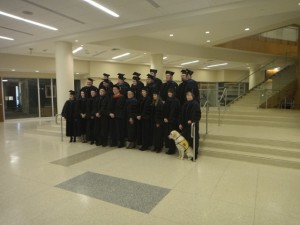Dogs and Contracts
 A few years ago I had the good fortune of getting to know Dr. Marty Greer when she was a student in the Law School’s part-time program. Dr. Greer is a veterinarian and lawyer in Lomira, Wisconsin. While in law school, Dr. Greer brought a service dog in training to class with her. The dog, Bahari, even attended her Law School graduation. (See photo)
A few years ago I had the good fortune of getting to know Dr. Marty Greer when she was a student in the Law School’s part-time program. Dr. Greer is a veterinarian and lawyer in Lomira, Wisconsin. While in law school, Dr. Greer brought a service dog in training to class with her. The dog, Bahari, even attended her Law School graduation. (See photo)
Over the years, Dr. Greer and I have chatted about the intersection of contract law and dog ownership. When entering into a relationship with a purebred dog, it’s important for a potential owner to realize that he or she is entering into a legal contract with the dog’s breeder.
A contract for the sale of an animal can be complicated. Positive communication and decision making early in the negotiation process are important for establishing a good relationship between a breeder and a potential owner. A contract for an animal creates a three-way relationship for the animal, the new owner(s), and the breeder(s). People’s emotions, as well as the dog’s well-being, are at stake. When done right, lifelong friendships can result. While this blog is not intended to provide legal advice, my questions and Dr. Greer’s answers are designed to give a reader a sense of the things the parties need to consider when contemplating the purchase of a dog.
